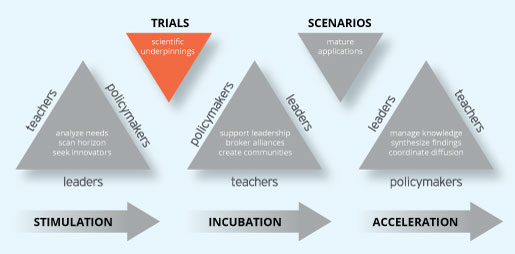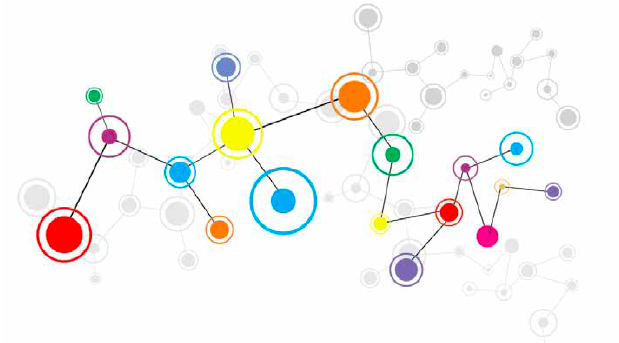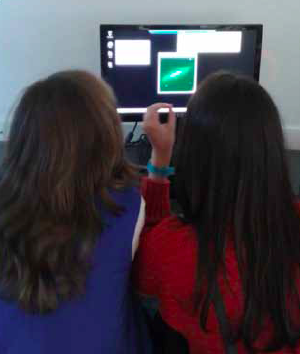
Trials
How are these new ideas related to our existing school plans? How can this be accomplished in our setting? Field trials give hands-on answers to questions posed by schools

Getting practical
What do trials entail? How are they organized? What are important features?
Trial events are organised to work out practical implementations of different educational scenarios in real learning situations. Often, trials are built around some learning event, which supports everyday learning in the classroom. As innovation champions speak about opening learning and widening borders of classrooms, collaborative learning events between different classrooms and regions and countries are encouraged.
Trials may be viewed as a set of experiments and observations undertaken to decide how and whether new learning methodologies and educational scenarios can be used regularly in everyday learning process at the school. During field trials schools get hands-on experience. Trials are excellent opportunities for adapting new learning solutions to school needs, especially when they feature commentary or feedback for the participating groups.
Field trials are performed in schools often during normal learning hours, but they still have an informal flavour in many cases. During field trials, teachers and pupils tend to be more free to experiment and try out different solutions. This enables the opportunity to see how new approaches or tools might better suit existing curricula. During field trials, schools may create opportunities to explain to parents and the local community how they are using new learning methodologies to help children get better education. During field trials, schools also gain valuable information for budgeting and investments.
Promising practices
This section offers sample field trial practices undertaken in ODS to facilitate elearning resources adoption in education. Each introduced participants to key concepts and uses of digital resources, while also engaging them in practical activities.
Summer schools
The first ODS Summer school took place in Crete. The Summer School activities were based on the exploitation and enrichment of two existing, open access repositories: Natural Europe and Discover the Cosmos. 81 European educators participated as trainees, attending 15 hours of lectures and demonstrations as well as 10 hours of hands-on workshops. Activities addressed three key-areas: inquiry-based science education; high energy physics and astronomy; and connections between formal and informal learning through museum visits. http://www.education.natural-europe.eu/natural_europe http://portal.discoverthecosmos.eu repositories
Webinars
Webinars are interactive conferences, online-workshops with a certain target group and goals. They give for schools new information, ideas and contacts. For example, ODS hosted a webinar entitled: How to build a strong Action Plan/European Development Plan for your school according to the Erasmus+ Framework. http://www.galileoteachers.org/live-ods-webinar/
Training academies
The ultimate goal of the ODS training academies is to nurture innovation leaders who will promote the uptake of eContent in schools. It delivers training programmes and online support specially targeted for a set of stakeholders key to the uptake of eContent. Four training activity themes are shown here. Each on addresses a different group of stakeholders.
Teacher training and ICT support academy
This programme assists teachers in acquiring and reinforcing the skills and knowledge they need to exploit the rich potential of eContent. They learn how to incorporate eLearning in their courses, to reuse and create eContent. It trains ICT support staff and administrators in schools to facilitate teachers and students working with eContent and to implement local eContent repositories, linking them to ODS.
Technology developer academy
This programme provides theoretical and practical training (e.g. in coding and interoperability) to developers in content use (packaging formats, access control, and licensing) and content discovery (metadata, vocabularies, protocols, and registries). Developers create learning resources and incorporate them in ODS immediately.
Content provider academy
This training offers guidelines and support to content providers to adopt learning technology specifications, standards, and tools in view of sharing their content with the eLearning community in general, and through ODS in particular.
eParents Academy
This is designed to inspire parents to become promoters in the uptake, sharing, and reuse of digital learning resources in schools. It also gives insight into eLearning and working with eContent that can support children’s learning.
Contests & competitions
Different kind of contests can be organized online or face-to-face. Several kinds of competitions have shown to be motivating for schools and interesting for teachers and students. Here, two examples from the ODS project work are given
ODS contest: "Let's move teaching process to the limelight!"
The submission period lasted for two months. During this time, teachers from all over Europe were encouraged to create learning scenarios (reusable ideas, similar to lesson plans). This contest was exciting because it was open to teachers from all over Europe. Eligibility was based on three simple conditions, each of which contributed to the advancement of the ODS mission:
- the participating teacher had to be a registered ODS teacher
- the teacher’s school that had to be a registered ODS school
- the learning scenario had to be created with ODS authoring tools
Multilingual international online contest
This competition featured and required automatic translation. The contest aimed to promote the use of automatic translation in regular schools. The contest was linked to the Organic.Lingua project, but was also connected with ODS. It Organic.Lingua project results. All together, 1846 participants from Estonia, Latvia and Crimea participated. Planning of the contest started months ahead. This included selecting student ages, identifying topics of interest to schools, and exploring tools and innovative solutions available to meet schools needs. It also featured discussions among teachers from different countries to select questions that should be included. Various schools and educational stakeholders were also involved. A few months later, the contest was ready to be translated and put online for all partners countries. After the contest was over, a finalizing phase took place. Teachers presented their experiences at a workshop in addition to their approaches to dissemination, promotion and feedback.
Informal teacher networking events
Informal mechanisms also foster teacher networking. For example, teachers can use eTwinning or participate in the Erasmus+ programme. Additional online collabrative learning events are being launched each day by various communities, universities, and development centres.
http://opendiscoveryspace.eu/eTwinning http://www.etwinning.net/

Masterclasses
The field trial can also take the form of a masterclass. This may, but does not necessarily, take place with support of local research facilities. Masterclasses are characterized by talks, given by a researcher or scientist, to teachers and students on specific topics. Following the presentation, debate usually takes place. Thereafter, the program follows with a hands-on session where students are introduced to a specific ICT hands-on tool with the purpose of exploring the subject in greater depth. The day may end with an event for the whole school and local community, for example, in the form of a science café.
This type of event can varied forms of impact. Here, three are mentioned in particular. First, it sparkles student interest for science. Second, it engages them in real research experiences via real, remote or virtual labs. And third, it promotes awareness among the overall community about the power of such approaches to influence the learning pathways of students.
| Beginning The day starts with a talk about modern trends in Astronomy. Researchers discuss recent discoveries and challenges. They are excited and detailed because they are speaking about their own fields of investigation. A hands-on session follows where students are introduced to specialized software. Stellarium, a powerful planetaria application, allows students to explore the night and day skies. This helps them to understand the most important phenomena related to celestial mechanics. This kind of masterclass was viewed as very powerful to teach (in this case): moon phases, eclipses, seasons, and planetary motion. |
e-Confident A more advanced session can take the work a step further, by engaging students in real research experiences. For example, students can participate in the regular campaigns for citizen science, promoted by robotic telescopes. In these events, citizens (including students) are invited to participate in observing the skies and following analysis of the results. Students can, for instance, begin to understand the life cycle of stars while observing different stages predicted for such phenomena. |
||
 |
 |
||
Providing onlines tests for basic schools
Context
Online-tests are offered for teachers in Estonia by the Miksike Learning Environment. Miksike is a private institution in Estonia, which offers electronic learning content and services built on electronic content. Online-tests are part of the formal learning in Estonian schools, which are created to measure how well pupils have learned (skills and knowledge) relating to certain topics. Tests are done according to the curriculum and schools are using them as a part of their lessons. Grades are given according to the curriculum. Initial grading is done by Miksike's teacher assistant – an educational professional working on Miksike’s behalf who is supporting teachers in the classroom. A classroom teacher can change the grade, if she considers it necessary. In the 2013/2014 academic year much online testing took place: http://miksike.ee 445. There were many different online-tests and 76500 graded tests. In total, 428 teachers from 127 (nearly 1/3) Estonian schools benefited from this online testing service.
Resources
Miksike's teacher assistant coordinates the creation of questions and exercises in online tests. Miksike’s teacher assistant gets feedback from teachers communities and takes into consideration their wishes and suggestions. Questions are taken from electronic collections, which are also available freely though the ODS portal. When necessary, new questions are formulated and illustrations are obtained though images Miksike has the right to publish, open source libraries, commercial image services such as clipart.com.
Tools
Miksike's own e-learning platform is used for online tests, which was initially created in the Frames of Socrates/Minerva project. It is a platform for teachers and learners. In Estonia the addresses are: http://miksike.ee (for Estonian schools) and http://miksike.net (for Estonian Russian schools). The platform has different rights for different users (teachers have special rights and students have limited rights) to be able to work so that teachers see more information than students do.
Process
In the portal on the Minu Miksike (My Miksike) page there is an area called Online-tests. Taking a test is an easy process for the teacher and student. Teachers can easily connect tests with certain classes and make the tests public, the time they are needed. Pupils do not see the tests before the time assigned by the teacher. Results contains the list of tests taken, points for every test, and the grade (mark). If a test has been graded, users can view it once again; see mistakes and points earned for each question. Teachers can also see how successful his or her students were in tests, also teachers can see the student mistakes.
Impact
Miksike has offered online tests over 5 years and now, it can be considered more a mainstream service than an innovation. There are several factors, which keep schools using it. First, it saves teachers time. Now teacher evening hours can be spent confirming, not initially correcting, test results; this leavesmore time for organizing and planning creative things in the classroom. Second (and importance of this aspect is growing), online tests facilitate cooperation between schools, classes and teachers. Teachers like to discuss with their collegues how to measure learning and also compare results with other classes.
Lessons learned
Online testing services are suitable for eMature and eConfident schools as this requires good organizational skills on schools ICT personnel and teachers (enable whole class taking online tests same time etc.) and also some explanation needs to be done among parents and community as sometimes people outside of schools prefer to see classic paper tests when we speak about measuring pupils skills and knowledge. Teachers have to keep their eyes on security issues. It has sometimes happened that teachers forget their ‘teachers account’ password openly available and also primary grades are nowadays informed enough how to ‘benefit’ from this and cheating is possible.
Combining competition and learning
Context
Võistumiks is a set of learning activities offered for schools in Estonia by the Miksike Learning Environment. Võistumiks combines formal learning with elements of informal learning by using a contest/competition concept. Official grades are normally not given as a result of these events. Võistumiks helps learners to learn and repeat concepts, rules etc, which seem to be boring and difficult to remember. So this is just a small additional measure to help learners achieve learning goals set by the national curriculum. Learners learn in ways that they do not notice, because they are busy gaining as scores and points. Võistumiks is organized and coordinated by Miksike's teacher assistants – educational professionals working on Miksike’s behalf to support teachers in the classroom. Võistumiks is built up according to the teachers/schools needs and is community-centered. So, Miksike's teacher assistant`s task is to summarize and harmonize interests coming from schools. Võistumiks services started in the 2012/2013 study year and they continued 2013/2014. During 2013/2014, 20 Võistumiks learning events/contests were organized for the 1st - 9th grade students. 200-300 students normally participate in one Võistumiks event/contest.
Resources
Miksike's teacher assistant coordinates the creation of contests necessary for Võistumiks. Already existing exercises (over 8000 exercises) are used and if necessary, existing exercises are ‘cloned’ and modified. Miksike's teacher assistant gets feedback from teacher communities and takes into consideration their wishes and suggestions. Contest exercises are often attended by schools teachers and they follow the national curriculum. Miksike's teacher assistant sets exercises up for the contest.
Tools
Miksike's own e-learning platforms subplatform is used for Võistumiks and it is available currently for schools in Estonia working in Estonian language http://miksike.ee and in Russian http://miksike.net. The platform has different rights for different users (teachers have teachers rights and students have usual rights) to be able to work so that teachers see more information than students do.
Process
In the portal on the Minu Miksike (My Miksike) page there is an area called „Võistumiks“. Võistumiks contains of 3 phases. First 2 phases are contests, which are built on interactive exercises. Contests are published for a certain time (1-3 weeks). Students are supposed to answer questions correctly, and as quickly as possible. Quicker responses earn more points. Incorrect answers of course deduct points. For one attempt, students are given a certain amount of time (normally 4 minutes, but this can vary according to organizers plans). After time is up, results are saved in a results table. Students can make unlimited attempts during the period contest is open. It is also allowed to participate after school hours. Result tables contain only the highest scores students have made. Result tables are visible to all contestants/learners. Results of these 2 phases are summarized. During the 3rd phase, students have to take a quiz, which is built on questions/themes of the interactive exercises. Results are summarized and winners announced, prizes distributed for individual students and also for teams/classes.
Impact
Võistumiks is a comparatively new service in Miksike (started 2012/2013 study year) but it is gaining popularity. Combining competition and learning is a powerful tool and additionally motivates learners to learn concepts, which are normally considered as ‘boring’ ones. Võistumiks is suitable for eMature and eConfident schools and also to schools with less advanced eLearning practices. Võistumiks service is not explicitly aligned with the national curriculum.
Lessons learned
We need to find a good balance between learning and competition and keep in mind that the Võistumiks focus is on learning and not on figuring out who is the winner. Some pupils/teachers/schools get carried away so much by competition that the actualy learning is left in the background. Miksike strives to let much more contestants shine then just the ones gaining first places.
How to structure trials?
5 different ways to ensure both rich experiences for participants and collection of relevant insights to inform the innovation endeavor
Summer schools
Lectures and demonstrations and hands-on workshops combine to address three key-areas of substantive interest to teachers, while relevant outings and a pleasant atmosphere motivates participants.
Webinars
Like nteractive conferences, webinars are online workshops designed to speak to a certain target group and meat specific goals. They give for schools new information, ideas and contacts.
Training academies
These events nurture innovation leaders who will promote the uptake of change in schools. These deliver training programmes and online support specially target different sets of stakeholders.
Contests
Competitions have shown to be motivating for schools and interesting for teachers and students. An international dimension can also be stimulating.
Masterclasses
Specialist talks on specific topics are followed by active debate. This sets the stage for a hands-on session that engages participants directly with the issue at hand.

